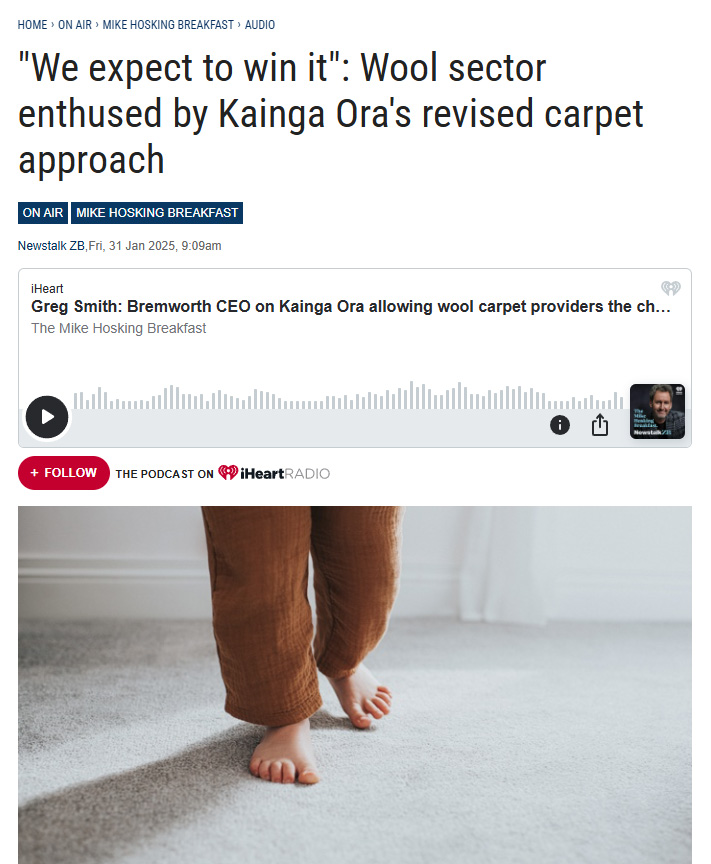Government Tender Shift Offers Major Boost for NZ Wool Industry
When Kāinga Ora initially excluded wool carpet from a major government housing tender, it posed a significant challenge to New Zealand’s wool industry. Following publicity around the exclusion, the tender was reopened and wool suppliers allowed to submit their offering. Recognising the importance of this issue, Impact PR worked closely with its client, Bremworth, to drive national awareness and advocate for change. As a leading PR agency Auckland businesses trust for high-impact campaigns, Impact PR secured extensive media coverage across major outlets, including RNZ, Newstalk ZB and others, ensuring the story reached key decision-makers and the wider public. This strategic effort played a role in highlighting the benefits of wool and reinforcing its place in New Zealand’s housing sector.
See the details below and find the full story here:
A major policy reversal by Kāinga Ora could provide a significant boost for New Zealand’s wool industry, as the housing agency reopens a multi-million-dollar tender for carpet supply across more than 5,600 homes.
This move comes at a time when strong wool prices have surged to $4 per kilogram—an eight-year high—driven by supply constraints and rising demand.
Previously, Kāinga Ora had explicitly ruled out wool carpets in its Request for Proposal for national carpet and underlay supply, despite a government directive supporting the use of natural fibres over synthetics where feasible. The exclusion sparked widespread concern within the wool sector over the lack of consultation.

A Win for New Zealand’s Wool Producers
Greg Smith, CEO of leading wool carpet manufacturer Bremworth, says the decision to reopen the tender is a major opportunity for the sector and urges industry players to step up.
“As a sector, we must demonstrate to both the government and consumers that wool carpets can compete on durability and price while delivering clear sustainability advantages,” Smith says.
“With Kāinga Ora managing more than 75,000 properties, this is a strong signal that the government is prioritising local industries over imported plastics. Choosing synthetic carpet would mean bringing in approximately 1.7 million kilos of plastic. Opting for wool instead not only strengthens New Zealand’s trade balance but also prevents this material from adding to landfill waste at the end of its life cycle.”
He adds that the scale of the contract could have far-reaching economic benefits, supporting sheep farmers who have been struggling with low wool prices for years and setting a precedent for other government agencies, commercial developers, and residential builders.
Wool’s Natural Advantages
Beyond the economic benefits, Smith highlights the functional advantages of wool carpets over synthetic alternatives.
“Wool is naturally stain-resistant and a built-in fire retardant, whereas synthetics rely on chemical treatments,” he explains.
“The natural properties of wool carpets make them ideal for creating healthier, safer homes—especially for vulnerable communities. Wool is hypoallergenic, highly durable, easy to maintain, and regulates humidity by absorbing moisture when the air is damp and releasing it when conditions are dry.
“It also provides excellent thermal and acoustic insulation, helping to keep homes warmer in winter and reducing noise levels,” he adds.
A Turning Point for Sustainability
Smith sees the decision as a significant step toward a more sustainable future for New Zealand’s housing sector.
“Synthetic carpets don’t break down naturally, but wool is biodegradable. Reopening this tender to include wool sends a strong message of support to our primary industries while ensuring a more environmentally friendly future for our housing stock.”
With the tender process now back in play, Smith says it is up to the wool industry to make the most of the opportunity.
“It’s encouraging to see this shift in policy. Now it’s time for our industry to prove that wool is the superior choice—not just for sustainability, but for performance, longevity, and overall value,” he says.
If you have questions about public relations, contact us today. – we would love to help.
